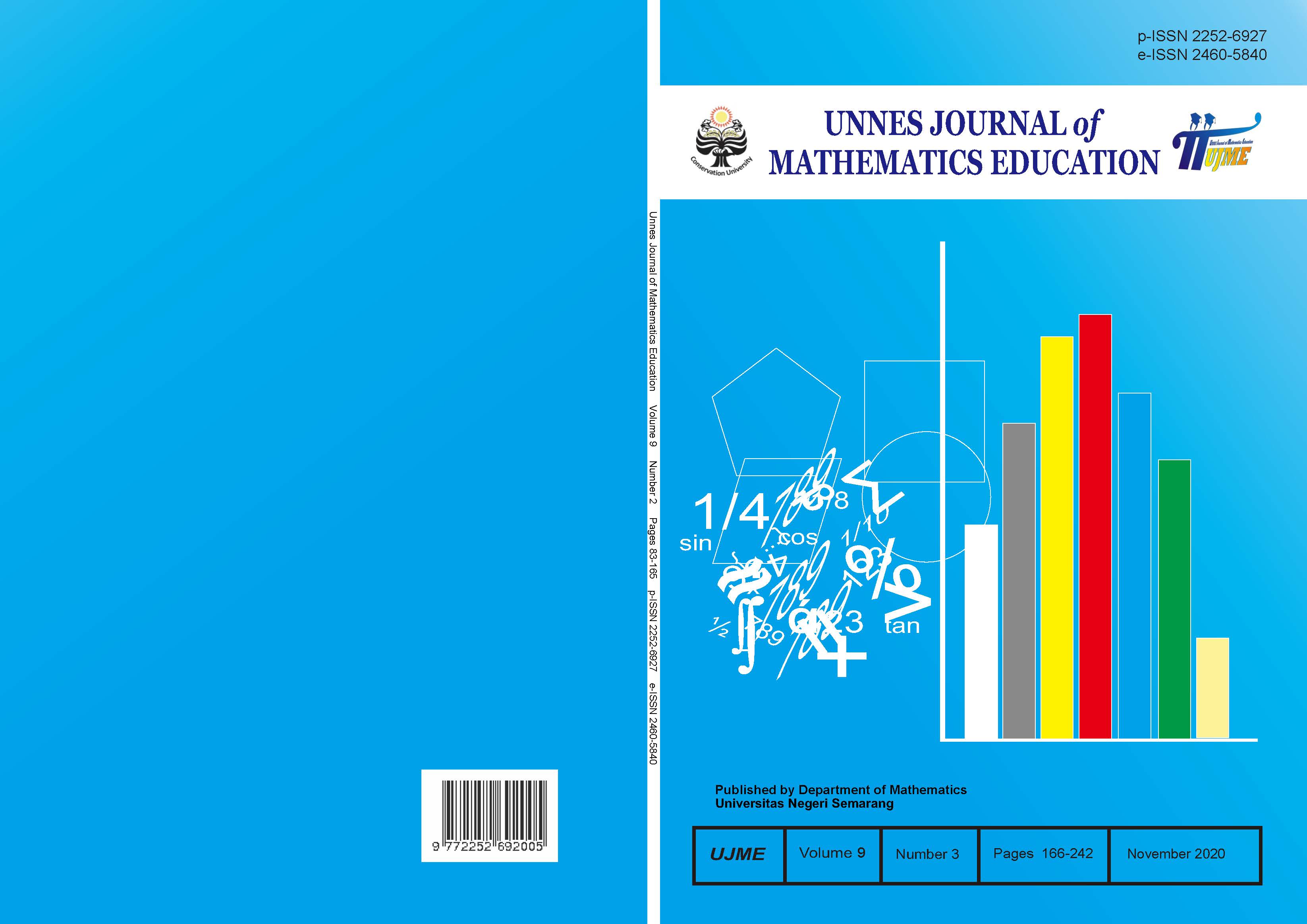Qualitative analysis on mathematical literacy ability and student responsibility with realistic mathematics education learning models of ethnomathematics nuance
##plugins.themes.academic_pro.article.main##
Abstract
The purpose of this research is to know the ability of mathematical literacy and the responsibility of students with an ethnomathematics-style Realistic Mathematics Education learning model. This type of research is a qualitative research that is descriptive. To establish the validity of qualitative data then the inspection techniques used in this research using the triangulation of the source, that is to compare the suitability of data obtained from the results of interviews and tests. The study was conducted on one of the junior high schools in Semarang, and there are 6 research subjects representing each of the 2 students for the group of high responsibility categories, 2 students for the category of medium responsibility groups, and 2 students for the group of low liability categories. In this study it was found that there were students representing the responsibilities of being granted results from mathematical literacy skills tests with the same results as students representing high responsibility groups. The factors influencing the findings are the thoroughness of the students representing the group of responsibilities being in Corrected their work.
##plugins.themes.academic_pro.article.details##
References
Abdulah, A.S. (2017). Ethnomathematics in Perspective of Sundanese Culture. Journal on Mathematics Education, 8(1), 1-16.
Aisyah, A., Nusantoro, E., & Kurniawan, K. (2014). Meningkatkan Tanggung Jawab Belajar Melalui Layanan Penguasaan Konten. Indonesia Journal of Guidance and Counseling: Theory and Application, 3(3), 44-50.
Ardila, R. M., Nurhasanah, Salimi, M. (2017). Pendidikan Karakter Tanggung Jawab dan Pembelajarannyadi Sekolah. In Prosiding Seminar Nasional Inovasi Pendidikan.
Azwar, S. (2015). Penyusunan Skala Psikologi Edisi 2. Yogyakarta: Pustaka Belajar
Barnes, Hayley, (2005). The theory of Realistics Mathematics Education as a theoretical framework for teaching low attainers in mathematics. Phytagoras 61.pp 42-57.
Budiono, C.S. & Wardono. (2014). PBM Berorientasi PISA Berpendekatan PMRI Bermedia LKPD Meningkatkan Literasi Matematika Siswa SMP. Unnes journal of Mathematics Education (UJME) 3(3). ISSN 2252-6927.
Creswell John.W. (2014). Penelitian Kualitatif & Desain Riset. Yogyakarta: Pustaka Pelajar.
D’Ambrosio, U. (2006). “The Program Ethnomathematics and the Challenges of Globalizationâ€. International Journal for the History of Science. Volume 1(8), 74-82.
Dalyono. (2007). Psikologi Pendidikan. Jakarta: Rineka Cipta.
Dimyati, dan Mudjiono. (2013). Belajar dan Pembelajaran. Jakarta: PT. Rineka Cipta.
Harususilo, Yohanes, E. Skor PISA (2018): Daftar Peringkat Kemampuan Matematika, Berapa Rapor Indonesia?. Publikasi Kompas.com. https://edukasi.kompas.com/read/2019/12/0 7/09425411/skor-pisa-2018-daftar-peringkatkemampuan-matematika-berapa-raporindonesia. Diakses tanggal 27 Desember 2019.
Kemendikbud. (2010). Pengembangan Pendidikan Budaya dan Karakter Bangsa. Jakarta: Kemendikbud.
Marpaung,Y; Juli, Hongki. (2012). PMRI dan PISA : Suatu Usaha Peningkatan Mutu Pendidikan matematika di Indonesia. Jurnal Widya Dharma, Vol.23, No.1
OECD. (1999). Measuring Student Knowledge and Skills : A New Frameworl for Assessment. OECD Publising. https://www.oecd.org/edu/school/programmeforinternationalstudentassessmentpisa/336939997 .pdf. Diakses tanggal 7 Juni 2018
OECD. (2014). PISA 2012 Results in Focus: What 15-year-olds know and 2 what they can do with what they know. OECD Publising. https://www.oecd.org/pisa/keyfindings/pisa2012-results-volume-I.pdf. Diakses tanggal 7 Juni 2018.
Rachmawati, I. (2012). “Eksplorasi Etnomatematika Masyarakat Sidoarjoâ€. Surabaya: Universitas Negeri Surabaya.
Sugiyono. (2012). Metode Penelitian Pendidikan Pendekatan Kuantitatif, Kualitatif, dan R&D. Bandung: Alfabeta.
U.S., Supardi. (2012). Pengaruh Pembelajaran Matematika Realistik terhadap Hasil Belajar Matematika Ditinjau dari Motivasi Belajar. Cakrawala Pendidikan, Juni 2012.
Treffers, A. (1991). Realistic mathematics education in the Netherlands 1980 – 1990. In L. Streefland (Ed.). Realistic mathematics education in primary school. Utrecht: CD- Press, Freudenthal Institute.
